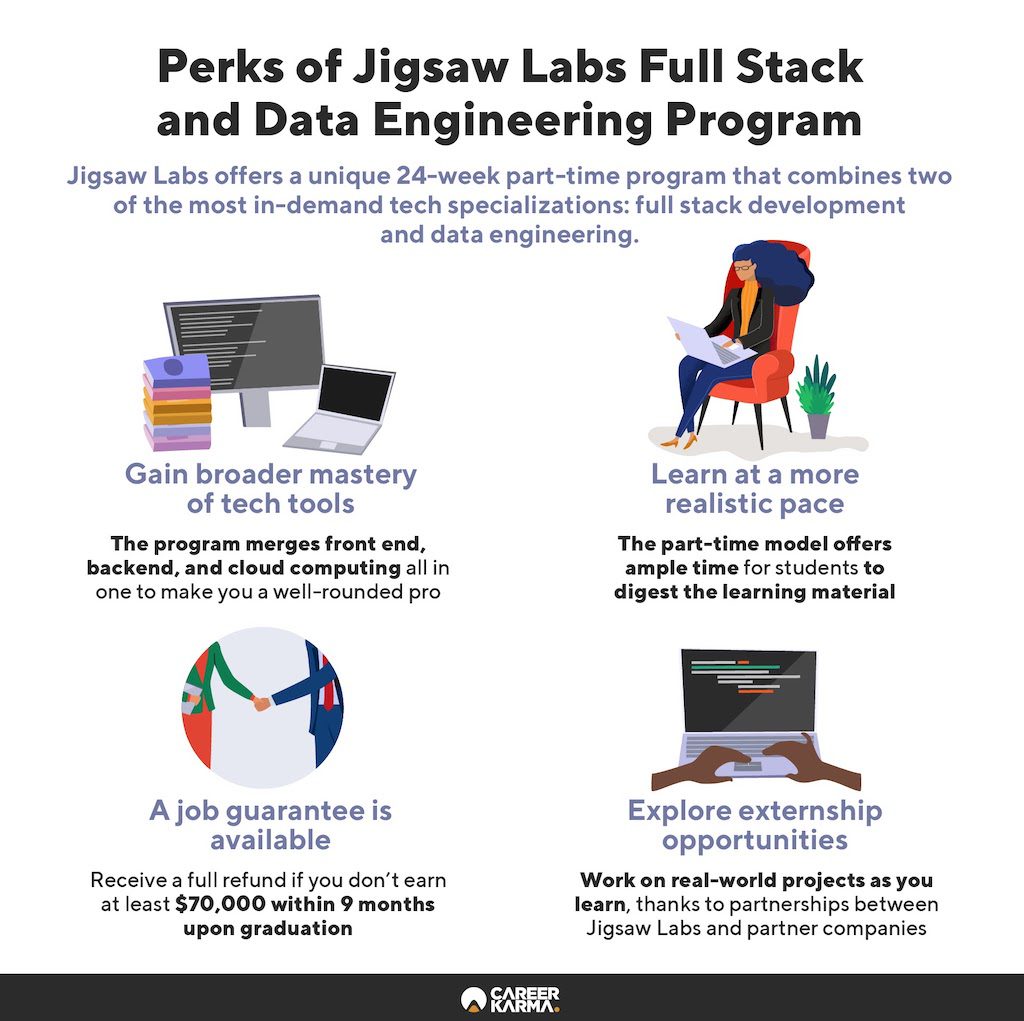The data science revolution is here to stay. But the biggest hiring need for companies is in finding talented engineers to collect, organize and clean various data sources before any analysis can occur. As more companies realize this fact, they’re rapidly hiring professionals who have these skills. According to Dice’s 2020 Tech Jobs Report, data engineering is the fastest-growing tech job of all, with year-over-year growth of 50 percent.
You have likely heard of data science, where data scientists and machine learning engineers use machine learning algorithms to predict and explain future performance. But for any of these predictions to occur, the machine learning algorithm first needs to be fed data from a variety of sources, and that data needs to be properly cleaned, validated, and formatted.
This is no trivial matter. Properly collecting and handling data requires skills with back-end engineering, cloud computing, and data pipelines. Not only are these skills needed by data scientists and machine learning engineers on the job, but they’re so in demand that a variety of careers have emerged dedicated to this skill set—from data engineer to analytics engineer and MLOps.
To meet this demand, Jigsaw Labs has been teaching students the skills they need to launch a career in data engineering. Although this bootcamp started in October 2020 focused on a data science curriculum, it saw that employers demanded students get the data engineering skills first.
Beyond preparing students for a career in data, Jigsaw Labs found that focusing on a data engineering skillset gave students the skills they would need for any modern engineering role. Students learn backend technologies like Python, Postgres, and testing alongside cloud computing technology like Amazon Web Services (AWS) and Docker while learning how to properly collect data through data pipelines.
Modern software engineers can benefit from these tools just as much as data engineers. And to address this overlap, Jigsaw Labs has decided to offer a single course that teaches both full-stack software engineering alongside data engineering.
Jigsaw Labs offers a part-time full-stack and data engineering program, fit for students who want an accelerated path into the modern workforce.
Set up a call with Jigsaw Labs today.What Is Jigsaw Labs?
Jigsaw Labs is a part-time full-stack and data engineering bootcamp that helps prepare students for the workforce with modern software and data engineering stack. After speaking with data science employers, the school’s founder, Jeff Katz, noticed that entry-level data science positions were becoming flooded with applications, leaving little opportunity for even highly-qualified candidates.
However, entry-level positions in data engineering were available. The opportunity was clear, and with years of experience as a software engineer, data scientist, and instructor, Jeff realized that this underserved niche could give aspiring data professionals the entry-point they’d been hoping for.
After scraping thousands of data engineering positions on Indeed.com, and speaking to dozens of hiring managers, Jigsaw Labs developed a curriculum around back-end engineering, cloud computing, and data pipelines. After graduating its first cohort in June of 2021, and placing half the class with quality positions within two months of graduation, the school believes that it’s discovered a path for many people to become enticing candidates for these open jobs.
We’ve already touched on much of what data engineers do in this article, but it may help to learn more about the discipline.
What Is Data Engineering?
Data engineering is an engineering discipline focused on building data pipelines that collect, clean, and sift through raw data.
Data can come from a variety of sources. Think of an e-commerce company like Amazon. It may collect data from its own databases, scrape data from other websites, or retrieve data from APIs. This data may be first collected into an unsorted data lake, then better organized in a data warehouse. Finally, different queries may be run against this data to present to various stakeholders—whether in operations, marketing, product, or other data professionals.
At coding bootcamps like Jigsaw Labs, you can learn the software engineering skills you need to do this job well, at a respectable price.
What Makes Jigsaw Labs Unique: Flexible Structure, Job Guarantee, Low Cost

Jigsaw Labs offers plenty of attractive features to aspiring data engineers. Its part-time structure allows you to learn cutting-edge tools without taking time out of your current job. Unlike many other part-time coding bootcamps, it’s so confident in its training that it offers a job guarantee with a high salary. And you’ll be able to keep much of your new salary thanks to the program’s low cost.
Flexible Structure
Jigsaw Labs’s part-time structure allows students to take the course on a more forgiving schedule. Because it’s part-time, you’ll have less pressure to keep up than you would with an immersive bootcamp. The course takes place on Sundays, Tuesdays, Wednesdays, and Thursdays, so you have plenty of days between instruction to catch up.
Job Guarantee
Jigsaw Labs offers a $70,000 job guarantee. So if you don’t land a job making $70,000 within nine months, you receive a full refund. Half of the candidates from the program’s first cohort have found quality jobs within two months of graduation, with salaries averaging at around $115,000. Jeff spends a lot of time hunting down leads for graduates, so this safety net allows you to rest easy even during your job hunt.
Accessible Cost
The program costs $9,500 upfront, but you can also study now and pay later by taking advantage of its income share agreement (ISA). This ISA has a payment cap of $13,500, so if you do land a job making the average salary out of the program, you most likely won’t be paying Jigsaw Labs back for an extended amount of time.
Jigsaw Labs Curriculum
Jigsaw Labs’s flagship data engineering course teaches full-stack software and data engineering skills within 24 weeks. Students learn from 6.30 pm to 9.30 pm on Tuesday through Thursday, with a full day on Sunday from 12.30 pm to 9.30 pm. As noted above, this schedule allows you to catch up with the course’s comprehensive curriculum in case you fall behind.
The first part of the course covers full-stack engineering. You’ll develop skills in Python, SQL, and Flask, front end technologies like HTML, CSS, and React, and finish with AWS and Docker. The second part of the course moves into data pipelines, teaching skills for collecting data from various sources to present to stakeholders and going even deeper into SQL.
Then, in the final section, students learn how to work with large professional codebases that consist of thousands of files. Students show their skills in this last module by making contributions to large open-source codebases.
Your next chance to take the course starts on October 19 and ends on April 18, 2022. After you learn the core technologies from the course, you’ll get to take part in your very own Jigsaw Labs externship as part of post-work.
Jigsaw Labs Externship
The Jigsaw Labs Externship is the result of a business agreement between the school and several real companies. These externships appeal to companies because instead of teaching interns everything and losing valuable productivity time, Jigsaw Labs assumes more of the risk.
In this program, students work on real projects during class time, while continuing to have class twice weekly. Jeff personally helps students get past tricky coding issues, reviews their code, and helps them get the project management side of the field down.
Initially, Jeff fields all of the directions and comments that organizations have. But as students improve in the field, they work more closely with the company. This portion of the program is where self-starting students shine brightest, as they get to work independently to solve problems.
After graduation, students have gone on to many different jobs in tech.
Job Outlook
Jigsaw Labs graduates most often land jobs as data engineers, backend engineers, cloud engineers, full-stack engineers, and software developers. As the 2020 Dice Jobs Report has stated, these are some of the fastest-growing job markets in the entire tech industry. As you enter the field in one of these entry-level positions, you’ll have the chance to make an appealing salary.
Data engineers earn an average entry-level salary of $77,350, according to PayScale. Cloud engineers start their careers earning around $79,888. Full-stack software engineers make about $80,264, and full-stack software developers make around $65,653. All of these positions earn more than the national median salary of around $56,310, according to the US Bureau of Labor Statistics (BLS).
While many of these jobs carry attractive salaries, remember that the average salary for Jigsaw Labs graduates is around $115,000. This average salary more than doubles the national median salary, so Jigsaw Labs has allowed its graduates to make an impressive starting salary.
Take a Proven Path to a Data Career with Jigsaw Labs
Jigsaw Labs gives prospective data scientists the chance to enter a high-demand field with less competition and impressive starting salaries. The path isn’t easy or simple, but with personal support from an experienced data scientist and software engineer as well as a job guarantee, Jigsaw Labs believes it can be manageable and rewarding.
If Jigsaw Labs’s model interests you, set up a call with founder Jeff Katz today.
About us: Career Karma is a platform designed to help job seekers find, research, and connect with job training programs to advance their careers. Learn about the CK publication.




